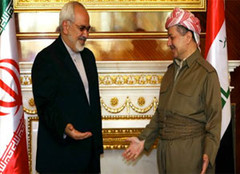Iranian Kurdish Parties Retreat Under Pressure From Tehran
» Zarif: Any Group Not Under Our Control is a Terrorist Organization
Following the orders of Iraq’s Kurdistan Regional Government for Iranian military parties to withdraw from the front fighting the Islamic State insurgents, Iran’s foreign minister speaking to reporters called groups that were not under the command of the Islamic republic of Iran “terrorists.”
Mohammad Javad Zarif made the remarks while visiting Iraq for the third time when he also visited the Irbil, the capital of Iraq’s Kurdistan Regional Government for the first time, where he met Masoud Barzani, the president of KRG and in Soleymanie Jalal Talebani, the previous president Iraqi who heads the Patriotic Union of Kurdistan.
Stressing on the need to continue Iran’s relations with Iraq and the KRG, Zarif said, “The battle against terrorism must be all encompassing till its complete defeat and regional countries and groups, including those outside the region need to carry out their responsibility in this regard.”
During his trip, Zarif also said that Iran did not have military forces in Iraq but that the country was ready to provide assistance to Iraq and Kurdistan.
News agencies reported that Masoud Barzani told reporters in a joint news session with Zarif that “the Islamic republic was among the first countries that sent arms to Kurdish peshmarga.”
Iran’s minister of interior Abdol-Reza Rahmani Fazli had made similar remarks on Monday when he said, “After the recent attacks of IS in Iraq’s Kurdistan, Kurdish authorities asked for Iran’s help and the Islamic republic organized their forces in addition to providing consultations.”
Relations between KRG and Iran soured after recent events in Iraq but with Zarif’s trip and Barzani’s remarks about Iran’s military assistance to the KRG, it appears the two have improved their relations.
As soon as IS forces attacked Kurdish regions in Iraq outside the control of KRG, many Kurdish groups such as Kurdistan Workers Party, Kurdish Democratic Party and Khabat Organization went to the fronts to help the Kurdish peshmerga fighters. But just a few days after these reports, news came that Iranian Kurdish groups had left the fronts and returned to their camps on orders from Iran’s Revolutionary Guard commander Ghasem Soleymani.
The following is an analysis by a Rooz reporter of these recent developments.
A week after the publication of news that Iranian Kurdish groups were told to withdraw from fronts in Iraq fighting IS, Kurdistan Komala Party and Kurdistan Workers Komala Party (Komala Zahmatkeshan Kordestan), Iranian groups opposing the Islamic republic of Iran, announced that more than 150 of their fighters had positioned themselves around Kirkuk to confront IS forces and help the peshmerga of the KRG.
While Zarif was on a two-day visit to Iraqi Kurdistan, Rudaw news agency reported that Komala forces has withdrawn their forces from Kirkuk after being in the front against IS forces. It said that the forces withdrew on orders from the peshmerga commanders. Abdollah Azarbar, the commander of the Kurdistan Komala Party told Rudaw that his forces had gone to the fronts with the formal consent of the head of the KRG but after a few days the command of the peshmerga in the Kirkuk region had asked the fighters to retreat without providing any reason.
Published reports indicate that this was done because of pressure by the Islamic republic on Irbil.
Speaking to reporters during his visit to Iraqi Kurdistan, Zarif told a BBC reporter, “We have one armed force and that is the one that operates under the command of the Islamic republic of Iran. If there is another group it is terrorist and we do not recognize it.”
Reporters from the KRG have said that Iran had threatened the KRG government that if the peshmerga from Iranian Kurdish groups continued to stay in the fronts against the IS forces, Iran would shut its border to the KRG.
Kaveh Ahmad, a senior editor of the Kurdish television channel NRT in Soleymanie told Rooz, “Sources inside the KRG have informed us that the Komala peshmerga were told to withdraw on orders from the head of the KRG. According to them, this action came mostly because of pressure from the KPU party which is close to Iran.” According to him, officials from the KRG and the KPU were under pressure from the Islamic republic of Iran.
Iranian Kurdish groups have had a political and military presence in Iraqi Kurdistan for over two decades.


